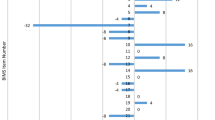Abstract
Black South African students have a poor success rate in school leaving mathematics examinations. Attempts have been made to shift teachers' practices from teacher-centredness to learner-centredness, in Black schools, in order to improve the situation. So far, the attempts failed to yield the desired results. This paper reports on the findings of a study that aimed at learning from students and teachers in Black schools, as to what classroom practices lead to success in school mathematics, in their impoverished context.
Similar content being viewed by others
REFERENCES
Arnott, A. and Kubheka, Z.: 1997, Mathematics and Science Teachers: Demand, Utilisation, Supply, and Training in South Africa, A Report for the Department of Education and Training, and the Department of Arts, Culture, Science and Technology. EduSource, Johannesburg.
Boaler, J.: 1997, Experiencing School Mathematics, Oxford University Press, Buckingham.
Brodie, K.: 1998, 'Teacher or learner-centred: How do mathematics teachers in South Africa teach?' in N. Ogude and L. Bohmann (eds.), Proceedings of the Sixth Annual meeting of the Southern African Association for Research in Mathematics and Science Education, Unisa, Pretoria, pp. 82–89.
Cuban, L.: 1993, How Teachers Taught: Constancy and Change in American Classrooms 1890-1990, Teachers College Press, New York.
Harvey, S.: 1999, 'An evaluation of the role of classroom-based coaching in primary science InSET in South Africa', International Journal of Educational Research 19, 191–205.
Howie, S.J.: 1998, 'TIMSS in South Africa: The value of international comparative studies for a developing country', in J. Adler (ed.), Proceedings of the National Seminar on TIMSS and Related Mathematical Assessment in South Africa, Wits University, Johannesburg, pp. 22–40.
Kitto, A.: 1994, Reflections on an Attempt to Implement Modern Learning Theories in a Standard Nine Class? AMESA Proceedings of the First National Congress and Workshop. Hienemann Publishers, Johannesburg, pp. 104–114.
Lubisi, C., Wedekind, V., Parker, B. and Gultig, J.: 1997, Understanding Outcomes-Based Education: Knowledge, Curriculum and Assessment in South Africa, South African Institute for Distance Education (SAIDE), Johannesburg.
Ma Liping: 1999, Knowing and Teaching Elementary Mathematics: Teacher's Understanding of Fundamental Mathematics in China and the United States, Lawrence Erlbaum Associates Publishers, Mahwah, New Jersey.
National Department of Education (1995) Curriculum Framework for General and Further Education and Training, Pretoria.
Author information
Authors and Affiliations
Rights and permissions
About this article
Cite this article
Nkhoma, P.M. What successful black South African students consider as factors of their success. Educational Studies in Mathematics 50, 103–113 (2002). https://doi.org/10.1023/A:1020509528995
Issue Date:
DOI: https://doi.org/10.1023/A:1020509528995




